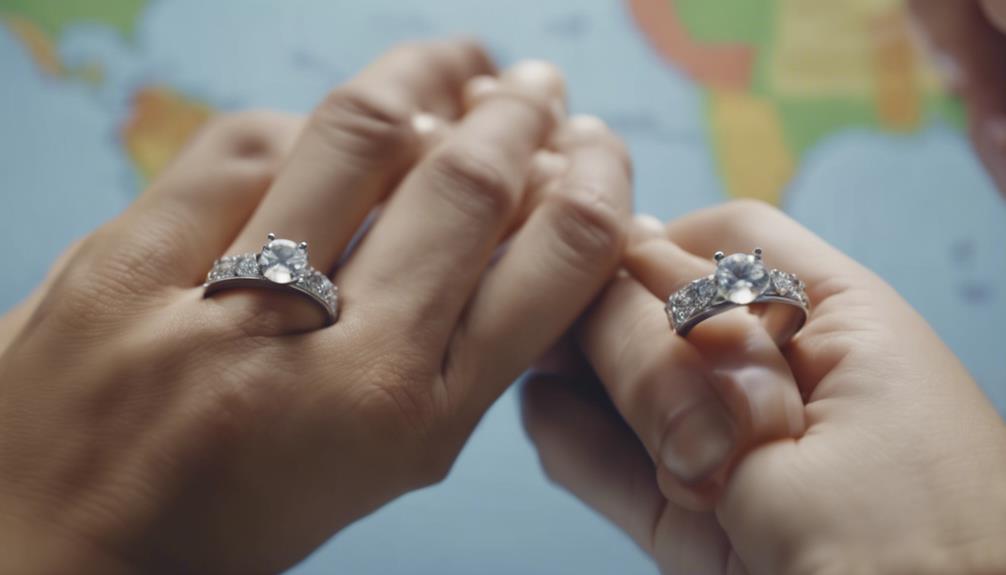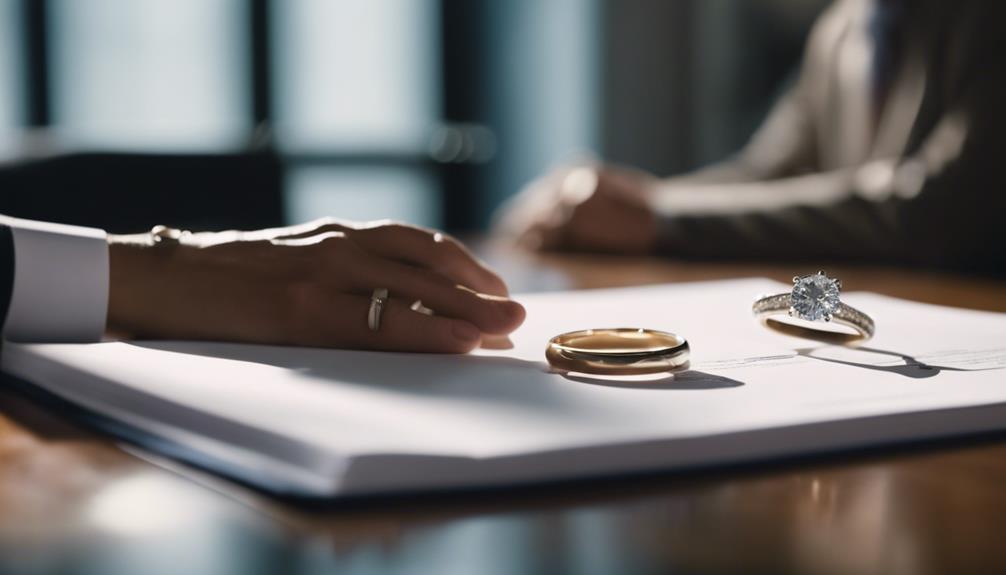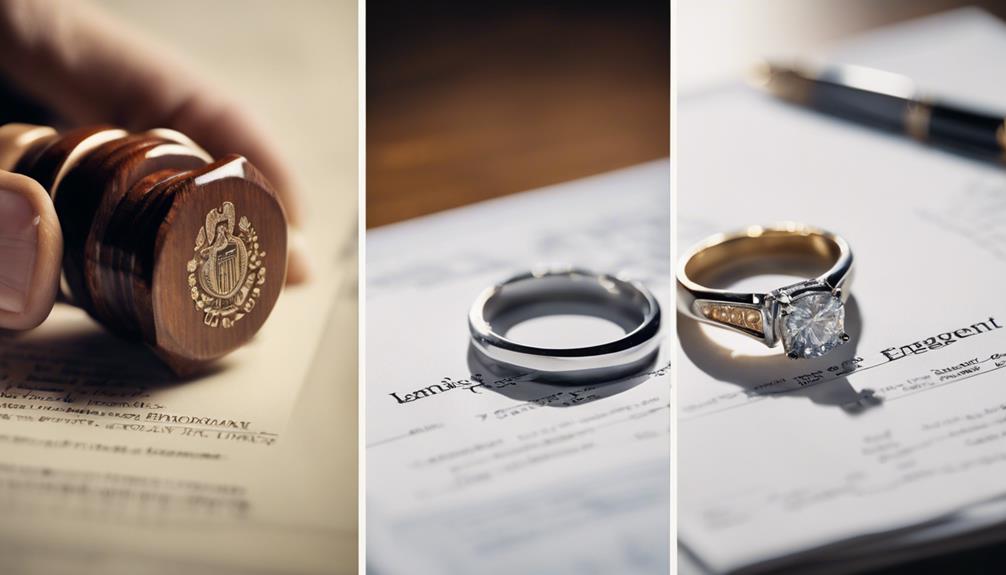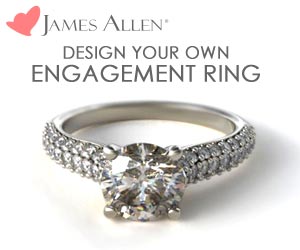You generally have to return an engagement ring if the marriage doesn’t happen since it’s a conditional gift. Most states consider the ring as given with the expectation of marriage, so when that condition isn’t met, the ring goes back to the giver. However, laws differ—Montana, for example, sees the ring as an unconditional gift, letting you keep it. Some states use fault to decide, meaning if you broke the engagement, you might need to return it. Specific state laws and circumstances can affect what happens, so understanding these nuances can provide further insights.
Legal Status of Engagement Rings

In most jurisdictions, engagement rings are considered conditional gifts, meaning their ownership hinges on the marriage actually taking place. If the marriage doesn’t occur, engagement ring laws generally dictate that the ring should be returned to the giver. This is because the ownership of an engagement ring is tied to the fulfillment of the marriage condition.
When a broken engagement happens, the one who bought the ring usually retains ownership unless there were agreements or specific circumstances like fraud. In many U.S. states, the legal precedent supports this view. Yet, exceptions exist. For instance, Montana courts allow the recipient to keep the ring regardless of the marriage outcome.
In fault-based states, the person who ends the engagement loses their right to keep the ring. Conversely, no-fault states typically favor the giver retaining the ring, regardless of who called off the engagement.
Legal interpretations can vary considerably by jurisdiction. States like New Jersey and Massachusetts may consider the circumstances surrounding the breakup when determining who should return the engagement ring. Consulting a family law attorney can help you understand specific state laws and navigate these complex issues.
Conditional Vs. Unconditional Gifts
Engagement rings often serve as quintessential examples of conditional gifts, where their ownership hinges on the occurrence of marriage. If you receive an engagement ring, its status as a conditional gift means you’re expected to return it if the wedding doesn’t happen. This is because the ring’s ownership is contingent on the completion of the marriage.
In contrast, an unconditional gift is given without any strings attached. Once given, the recipient has full ownership regardless of any future events or changes in the relationship. However, engagement rings rarely fall into this category due to their traditional symbolism and intent.
Understanding the difference between conditional and unconditional gifts can help clarify why you might need to return an engagement ring. The ring is typically given with the implicit agreement that marriage will follow. If this condition isn’t met, the legal expectation is often that the ring will be returned to the giver.
It’s essential to recognize these distinctions when considering the legal implications of an engagement ring. Knowing whether it’s classified as a conditional or unconditional gift can greatly influence your responsibilities and rights regarding its return.
State Laws on Engagement Rings

Understanding the distinction between conditional and unconditional gifts sets the stage for exploring how state laws specifically address engagement ring ownership.
Most U.S. states classify engagement rings as conditional gifts. This means that if the marriage doesn’t occur, the recipient must return the ring. For example, Iowa and Ohio courts enforce the return of the ring due to its conditional nature.
In contrast, states like Montana treat engagement rings as unconditional gifts, meaning the recipient keeps the engagement ring regardless of the marriage outcome. However, these states are in the minority. Generally, ring laws by state tend to favor the giver, especially when the marriage doesn’t happen.
Legal precedents vary, but states like New Jersey and Maryland uphold the giver’s right to reclaim the ring, irrespective of how the engagement ended. Colorado has a unique stance where if the ring-giver calls off the engagement, they don’t get the ring back.
Understanding these nuances is essential, as who keeps the engagement ring can hinge on specific state laws and the circumstances surrounding the breakup. Always consult local laws to navigate these situations effectively.
Fault-Based Vs. No-Fault Approaches
When steering through engagement ring disputes, it’s crucial to understand whether your state follows a fault-based or no-fault approach.
In a fault-based approach, the person responsible for the broken engagement typically has to return the engagement ring. States like Alaska take this route, linking ownership to who caused the breakup. If you’re seen as the one at fault, you’ll likely lose your claim to the ring.
Conversely, no-fault states treat the engagement ring differently. Here, ownership isn’t influenced by who ended the relationship. States such as Mississippi and Nebraska follow this principle, requiring the ring’s return regardless of fault. In these states, the ring is often considered a conditional gift tied to the marriage, so if the marriage doesn’t happen, the ring goes back to the giver.
In states like Massachusetts and New Hampshire, fault still plays a role in deciding who keeps the ring. The legal interpretation of fault can vary widely, leading to different outcomes even in seemingly similar cases. As a result, knowing your state’s stance on fault can greatly impact your engagement ring’s ownership after a broken engagement.
Seeking Legal Advice

Given the complexities of fault-based and no-fault approaches, it’s wise to seek legal advice to maneuver your specific situation effectively.
When dealing with an engagement ring, understanding its classification as a conditional gift under family law can be essential. Consulting a family law attorney will help you comprehend your legal rights and obligations regarding the ring.
Attorneys can provide vital guidance on whether the engagement ring is considered a conditional or unconditional gift in your jurisdiction. This distinction greatly impacts who retains ownership if the engagement ends.
If you’re facing disputes over the ring, a legal professional can aid in maneuvering the specific state laws that might apply to your case.
Seeking legal advice isn’t just about understanding ownership but also about addressing any emotional distress or disputes that arise from the breakup. Knowing your legal position can offer peace of mind and clarity in a challenging time.
Resources like FindLaw.com can assist in locating family law attorneys specializing in engagement and divorce issues, guaranteeing you have the support necessary to handle the situation properly.
Don’t hesitate to reach out to a legal expert to affirm your rights are protected.
Conclusion
Maneuvering the legalities of returning an engagement ring can be tricky. It often depends on whether the ring is seen as a conditional or unconditional gift and varies by state laws.
Understanding whether your situation involves fault can also affect the outcome. For clarity and to protect your interests, it’s essential to seek professional legal advice.
Remember, each case is unique, so getting tailored guidance will help you make the best decision.



